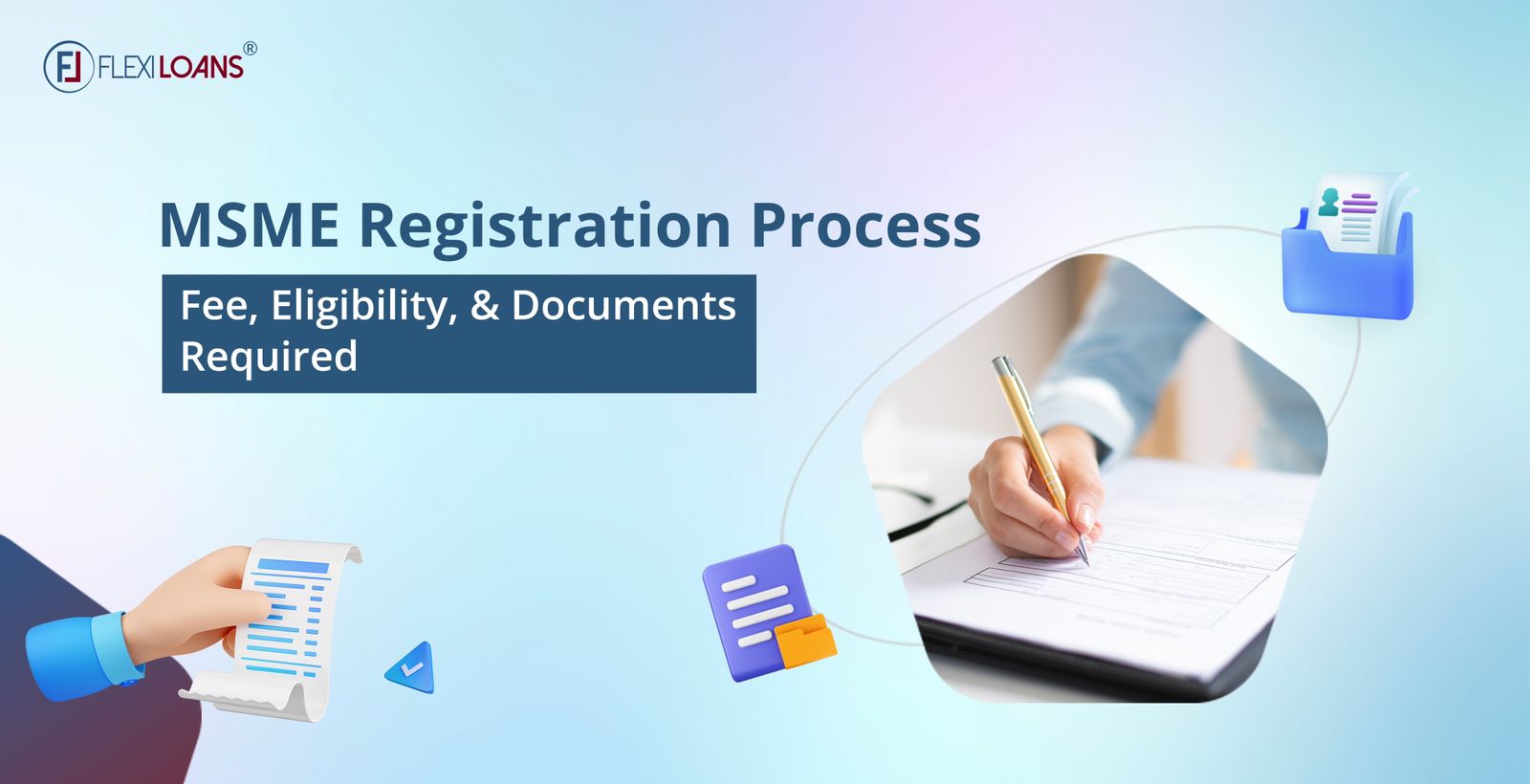Feb 27, 2025
Oct 17, 2025

Micro, Small, and Medium Enterprises (MSMEs) play a crucial role in India’s economic growth by generating employment and contributing to GDP. To support these businesses, the Indian government offers various incentives through MSME registration.
MSME registration helps businesses avail benefits like easier loan access, tax exemptions, and eligibility for government schemes. Registering as an MSME also provides legal protection and reduces compliance burdens. If you’re an entrepreneur looking to formalise your business, understanding the MSME registration process is essential.
This guide will walk you through the MSME registration process, eligibility criteria, benefits, required documents, and steps to apply online through the Udyam Registration Portal.
What is MSME Registration?
MSME registration is a government-recognised certification for businesses that fall under the Micro, Small, and Medium Enterprises category. The classification depends on the investment in plant and machinery and the annual turnover.
MSME Classification as per Latest Guidelines
| MSME Category | Investment Limit | Annual Turnover Limit |
|---|---|---|
| Micro | Up to ₹1 crore | Up to ₹5 crore |
| Small | Up to ₹10 crore | Up to ₹50 crore |
| Medium | Up to ₹50 crore | Up to ₹250 crore |
Businesses falling within these thresholds can apply for MSME registration under Udyam Registration—the official registration portal for MSMEs in India.
Benefits of MSME Registration
1. Access to Government Schemes
- Subsidies on loans and interest rates (under schemes like CGTMSE and PMEGP).
- Credit-linked capital subsidies for technology upgrades.
- Exemption from indirect taxes in certain cases.
2. Easier Loan Approvals
- Collateral-free loans from banks under the Credit Guarantee Fund Scheme.
- Lower interest rates on loans compared to non-MSME businesses.
- FlexiLoans provides quick, unsecured business loans to MSMEs, ensuring a seamless borrowing experience.
3. Priority in Government Tenders
- MSMEs get preference in public procurement tenders.
- Relaxation in tender participation norms, like exemption from EMD (Earnest Money Deposit).
4. Tax Benefits and Rebates
- Income tax exemption under certain schemes.
- GST exemptions and concessional rates for specific MSMEs.
5. Protection Against Delayed Payments
- MSMEs are legally protected under the MSME Development Act, ensuring payment within 45 days from buyers.
Eligibility Criteria for MSME Registration
Micro, Small, and Medium Enterprises (MSMEs) are vital to India’s economic growth, contributing significantly to employment, industrial output, and exports. To avail themselves of various government benefits and financial assistance, businesses must undergo MSME registration, also known as Udyam Registration.
Who Can Register as an MSME?
- Sole Proprietorships: Businesses owned and operated by a single individual.
- Partnership Firms: Businesses owned by two or more individuals who share profits and liabilities.
- Limited Liability Partnerships (LLPs): A hybrid business structure combining elements of partnerships and corporations, offering limited liability to its partners.
- Private Limited Companies: Companies with limited liability, restricted share transferability, and a maximum of 200 shareholders.
- Hindu Undivided Families (HUFs): A Hindu Undivided Family (HUF) is a family business structure recognised under Hindu law, where the family operates as a single entity.
- Trusts and Societies: Organisations established for charitable, religious, or other purposes, operating under specific legal frameworks.
Industry-Specific Eligibility
MSME registration classifies businesses based on their nature into two categories:
- Manufacturing Enterprises: Businesses engaged in the production of goods.
- Service Enterprises: Businesses providing professional services such as Information Technology (IT), healthcare, consultancy, and other specialised services.
Step-by-Step MSME Registration Process (Udyam Registration)
The Udyam Registration Portal enables businesses to complete MSME registration online at no cost.
Step 1: Visit the Udyam Registration Portal
Go to the official Udyam Registration website.
Step 2: Enter Aadhaar Details
- If you’re a proprietor, enter your Aadhaar number.
- For companies/LLPs, the Aadhaar of the authorised signatory is required.
Step 3: Provide Business Details
- Name of enterprise
- Type of business entity
- PAN card details (mandatory for companies)
- GSTIN (if applicable)
Step 4: Fill Investment & Turnover Details
Enter investment in plant & machinery and annual turnover figures.
Step 5: Verification and Submission
- Verify the details and submit the application.
- Once approved, you will receive the Udyam Registration Certificate.
Required Documents for MSME Registration
Though the process is paperless, the following documents may be needed:
- Aadhaar Card of the business owner
- PAN Card (mandatory for companies)
- GSTIN (if applicable)
- Bank account details
- Business address proof
Fees and Time Required for MSME Registration
- Registration Fee: ₹0 (completely free on the official Udyam Registration portal).
- Processing Time: Authorities process applications within 1-2 working days.
- Certificate Issuance: Once approved, applicants receive the Udyam Registration Certificate online.
- Download Option: Businesses can download the certificate from the portal after approval.
- Quick & Hassle-Free: The streamlined process ensures MSMEs quickly access government benefits.
- Accuracy Matters: Providing correct details helps avoid delays in registration and certification.
How to Check MSME Registration Status and Download Udyam Certificate
Steps to Check Registration Status
- Visit the Udyam Registration Status Check Page
Navigate to the official Udyam Registration portal and go to the status check section. - Enter Your Details
Provide your Udyam Registration Number (URN) and the mobile number registered during the application process. - Validate the Information
Click on “Validate & Check Status” to proceed. Ensure that your details are accurate to avoid any errors. - View Your Registration Status
The portal will display your MSME registration status. If your application is still under process, check back later. - Resolve Any Pending Issues
If your registration is delayed, verify the details provided during registration or contact Udyam support for assistance.
How to Download the Udyam Certificate
The Udyam Certificate is a vital document for Micro, Small, and Medium Enterprises (MSMEs) in India, providing access to various government schemes and financial benefits. Downloading your Udyam Certificate is a straightforward process through the official Udyam Registration Portal. Follow these steps to obtain your certificate:
- Visit the Udyam Registration Portal
- Navigate to the official website: Udyam Registration website.
- Access the ‘Print/Verify’ Section
- On the homepage, locate and click on the “Print/Verify” tab.
- From the dropdown menu, select “Print Udyam Certificate.”
- Enter Your Udyam Registration Details
- Input your 16-digit Udyam Registration Number (URN).
- Provide your registered mobile number and email address.
- Validate Your Information
- Click on “Validate & Generate OTP.”
- An OTP (One-Time Password) will be sent to your registered mobile number and email address.
- Enter the received OTP in the designated field.
- Download and Print Your Certificate
- After successful validation, your Udyam Certificate will be displayed.
- Click on the “Download” or “Print” option to save or print your certificate.
Challenges in MSME Registration and Solutions
1. Aadhaar Verification Issues
Many applicants face Aadhaar verification problems due to incorrect details or an unlinked mobile number. Since Aadhaar authentication is mandatory for MSME registration, ensure your Aadhaar is linked to your mobile number for OTP verification. If you face issues, update your Aadhaar details via the UIDAI portal before proceeding with registration.
2. Incorrect Classification
Incorrect entry of investment and turnover details can lead to misclassification of MSME category (Micro, Small, or Medium). To avoid this, carefully calculate and enter accurate figures based on the latest government criteria. Always cross-check your financial details and consult a professional if needed to ensure correct classification.
3. Technical Errors in Portal
Users may experience technical glitches while registering, such as page errors, slow loading, or submission failures. To resolve this, try registering using a different browser, clearing cache, or switching to another device. If issues persist, contact Udyam helpline support for assistance.
By addressing these common challenges proactively, businesses can smoothly complete MSME registration and unlock government benefits, financial support, and growth opportunities.
Role of the Government in MSME Registration
The government actively supports MSMEs through:
- Udyam Registration for easy business recognition.
- Subsidised loan schemes and tax incentives.
- Dedicated portals for MSME tenders and contract opportunities.
- Grievance redressal mechanisms for delayed payments.
How FlexiLoans Supports MSMEs
FlexiLoans is a leading digital lending platform dedicated to empowering MSMEs by providing easy access to finance. With over ₹2,000 crore in assets under management, FlexiLoans offers term loans ranging from ₹2 lakh to ₹25 lakh and supply chain finance with limits from ₹25 lakh to ₹10 crore. The company utilises innovative technology to help businesses realise their full potential, providing funding through its own Non-Banking Financial Company (NBFC) and lending partners integrated via FlexiLoans’ in-house tech platform.
Applying for MSME Loans with FlexiLoans
FlexiLoans offers MSME loans with the following features:
- Quick Approval: Rapid processing, with approvals often granted within 48 to 72 hours, allowing businesses to access funds without unnecessary delays. flexiloans.com
- Minimal Documentation: The application process is streamlined, requiring only essential documents, which significantly reduces the burden on MSME owners.
- Flexible Repayment Plans: Tailored repayment options to suit the cash flow and financial capabilities of MSMEs.
- Competitive Interest Rates: Affordable interest rates to ensure cost-effective financing for small businesses.
MSME registration is a crucial step for small businesses in India, offering numerous benefits such as easy access to credit, government subsidies, tax exemptions, and priority in tenders. By registering as an MSME, businesses can secure low-interest loans, protection against delayed payments, and financial assistance from government schemes.
With a registered MSME, entrepreneurs can expand operations, improve cash flow, and enhance business credibility. Don’t miss out on these growth opportunities!
Register your MSME today to access exclusive benefits and take your business to new heights. Start your journey toward financial success now!
FAQs
No, it is optional but highly recommended for business benefits.
It is lifetime valid, but businesses must update details if there are changes.
No, trading businesses are not eligible. Only manufacturing and service enterprises can register.
You receive an Udyam Certificate, which allows you to access government benefits.
Yes, GST is not mandatory for MSME registration unless applicable under tax laws.







